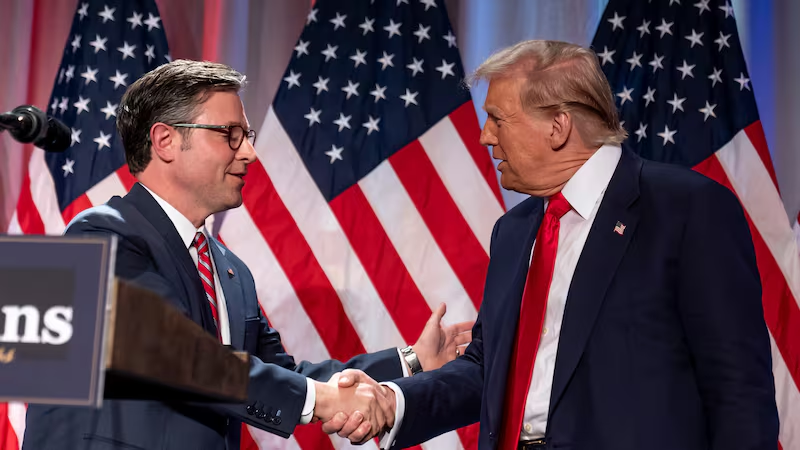President-elect Donald Trump has called on Republican lawmakers to deliver a comprehensive conservative policy overhaul through a single, expansive reconciliation package. This ambitious approach, discussed during a recent closed-door meeting led by Speaker of the House Mike Johnson (R-La.), aims to consolidate key GOP legislative priorities into one cohesive bill for passage within the first months of Trump’s administration.
Trump’s Vision for ‘One Big Beautiful Bill’
During the meeting, Speaker Johnson relayed Trump’s preference for what he described as “one big beautiful bill” that would include border security measures, energy policy reforms, and tax legislation. The President-elect believes this strategy will deliver a decisive, impactful victory for the Republican Party, showcasing its ability to govern effectively while addressing pressing issues central to the conservative platform.
Trump’s directive sets an ambitious timeline, urging both the House and Senate to complete the bill by May 2025. This push aligns with his broader agenda to make good on campaign promises swiftly, underscoring his commitment to bold action in his return to the White House.
Departure from Previous Legislative Strategy
Trump’s unified approach contrasts with a prior proposal by Senate Majority Leader John Thune (R-S.D.), who suggested splitting the agenda into two separate bills. Under Thune’s plan, Republicans would pass a combined border and energy bill first, followed by tax legislation. This phased strategy was seen as a way to reduce legislative complexity and navigate potential hurdles in the narrowly divided Senate.
Speaker Johnson had initially signaled support for the two-bill approach but has now aligned with Trump’s vision, emphasizing the importance of unity and cohesion in advancing the GOP’s policy goals. “President Trump’s direction is clear,” Johnson reportedly told lawmakers. “He wants one unified effort, not fragmented steps.”
Support from Key Republican Leaders
Trump’s push for a single, comprehensive package has gained the backing of influential party members, including House Ways & Means Chair Jason Smith (R-Mo.). Smith has long advocated for a unified approach, arguing that it would streamline the legislative process and create a more powerful message for the Republican agenda.
Smith, who attended New Year’s Eve celebrations at Trump’s Mar-a-Lago estate, stayed afterward for in-depth discussions with the President-elect about the reconciliation package. His support underscores the significance of the effort and highlights the GOP’s determination to deliver on its promises.
“We have an opportunity to deliver meaningful reforms that will benefit the American people,” Smith said. “A unified approach ensures we can address these priorities comprehensively and efficiently.”
Details of the Reconciliation Package
The proposed reconciliation package is expected to include several high-profile GOP priorities:
- Border Security: Enhanced measures to curb illegal immigration, including funding for border wall construction, increased staffing for Border Patrol, and stricter enforcement policies.
- Energy Policy Reforms: Initiatives to boost American energy independence, such as expanding domestic drilling, reducing regulatory burdens on energy producers, and promoting the development of traditional and renewable energy sources.
- Tax Legislation: Reforms aimed at lowering taxes for individuals and businesses, incentivizing job creation, and simplifying the tax code.
By bundling these priorities into one bill, Republicans aim to deliver a clear, unified message of conservative governance while maximizing the impact of their legislative efforts.
Challenges Ahead
The decision to pursue a single, expansive reconciliation package presents both opportunities and challenges. While the approach simplifies the legislative process by consolidating various priorities, it also requires Republicans to maintain unity across their ranks—a task made more difficult by ideological differences within the party.
With the GOP holding a slim majority in the Senate, every Republican vote will be crucial to passing the package. Moderate lawmakers may express concerns over certain provisions, particularly those related to border security or tax cuts. Conversely, more conservative members could push for even stricter measures, complicating efforts to reach consensus.
Implications for Trump’s Presidency
Trump’s push for a comprehensive legislative package reflects his determination to make a strong start to his second term. By delivering significant policy reforms early, the President-elect aims to solidify his political mandate and set the tone for the remainder of his administration.
“This isn’t just about policy—it’s about showing the American people that we can deliver results,” a senior GOP strategist said. “President Trump knows that a unified package will demonstrate Republican leadership and resolve.”
However, the decision to bundle multiple priorities into one bill also carries risks. Failure to pass the package could undermine the party’s momentum and provide ammunition to critics who argue that the GOP is unable to govern effectively.
Next Steps
Republicans now face the challenge of drafting a comprehensive bill that satisfies the diverse interests within the party while adhering to Trump’s timeline. Committee chairs and legislative leaders are expected to begin intensive negotiations in the coming weeks to finalize the package.
Trump’s May deadline leaves little room for error, but GOP leaders remain optimistic about their ability to deliver. Speaker Johnson emphasized the importance of unity, urging lawmakers to rally behind the President-elect’s vision.
“This is our moment to lead,” Johnson said. “The American people are counting on us to deliver.”
As Republicans prepare to implement their strategy, the stakes could not be higher. Trump’s vision for a sweeping conservative policy overhaul represents both a significant opportunity and a formidable challenge for the GOP. Success would cement the party’s ability to govern decisively; failure could hinder Trump’s efforts to fulfill his campaign promises. The next few months will be pivotal in shaping the trajectory of Trump’s second term and the Republican Party’s legislative legacy.

